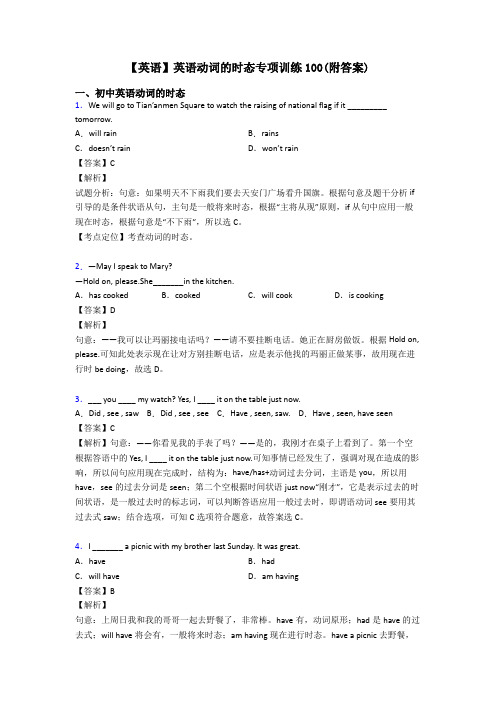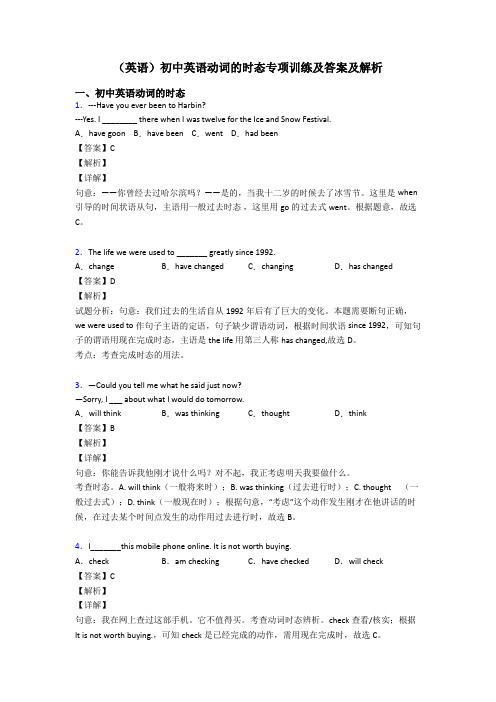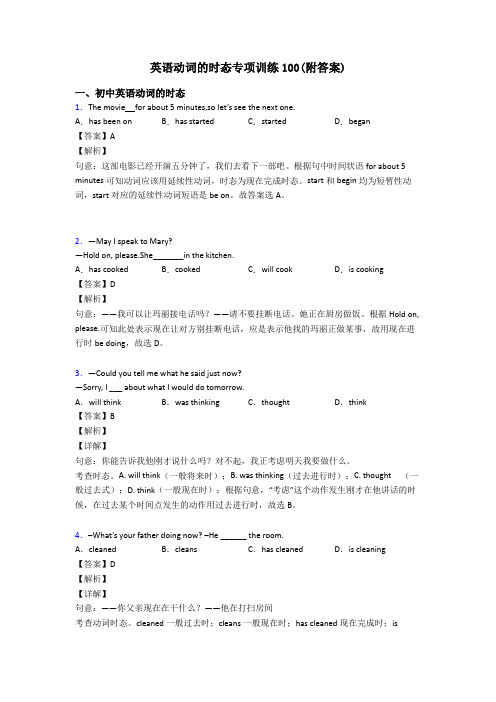英语动词的时态专项练习题及答案含答案推荐精选
初中英语动词的时态专项训练及答案

初中英语动词的时态专项训练及答案一、初中英语动词的时态1.–Have you seen yesterday’s TV play? I think Mary won’t marry the rich man.–I agree. Unless the man finally ________ his mind to helpthe poor.A.change B.changes C.changed D.will change【答案】B【解析】句意:你看过昨天的电视剧吗?我想玛丽不会嫁给那个有钱人的。
-----我同意。
除非这个人最终改变主意去帮助穷人。
unless引导的条件状语从句用一般现在时态表将来,故答案为B。
2.—Shall we play tennis now?—Sorry, I can’t. I my homework.A.do B.did C.have done D.am doing【答案】D【解析】句意:——我们现在打网球去好吗?——对不起,我不能去,我在做作业。
A. do做,用于一般现在时态,主语复数时;B. did做,用于一般过去时态;C. have done做,用于一般现在完成时态;D. am doing做,用于现在进行时态,主语是I时;根据now可知用现在进行时态,故选D3.—May I speak to Mary?—Hold on, please.She_______in the kitchen.A.has cooked【答案】D【解析】句意:——我可以让玛丽接电话吗?——请不要挂断电话。
她正在厨房做饭。
根据Hold on,please.可知此处表示现在让对方别挂断电话,应是表示他找的玛丽正做某事,故用现在进行时be doing,故选D。
B.cookedC.will cookD.is cooking4.Ken, can you turn down the music a little? I_________ to study for my test.A.am trying B.try C.tried D.have tried【答案】A【解析】句意:Ken,你能把音乐调小一点吗?我正在设法为我的考试研究。
【英语】英语动词的时态专项训练100(附答案)

【英语】英语动词的时态专项训练100(附答案)一、初中英语动词的时态1.We will go to Tian’anmen Square to watch the raising of national flag if it _________ tomorrow.A.will rain B.rainsC.doesn’t rain D.won’t rain【答案】C【解析】试题分析:句意:如果明天不下雨我们要去天安门广场看升国旗。
根据句意及题干分析if 引导的是条件状语从句,主句是一般将来时态,根据“主将从现”原则,if从句中应用一般现在时态,根据句意是“不下雨”,所以选C。
【考点定位】考查动词的时态。
2.—May I speak to Mary?—Hold on, please.She_______in the kitchen.A.has cooked B.cooked C.will cook D.is cooking【答案】D【解析】句意:——我可以让玛丽接电话吗?——请不要挂断电话。
她正在厨房做饭。
根据Hold on, please.可知此处表示现在让对方别挂断电话,应是表示他找的玛丽正做某事,故用现在进行时be doing,故选D。
3.___ you ____ my watch? Yes, I ____ it on the table just now.A.Did , see , saw B.Did , see , see C.Have , seen, saw. D.Have , seen, have seen【答案】C【解析】句意:——你看见我的手表了吗?——是的,我刚才在桌子上看到了。
第一个空根据答语中的Yes, I ____ it on the table just now.可知事情已经发生了,强调对现在造成的影响,所以问句应用现在完成时,结构为:have/has+动词过去分词,主语是you,所以用have,see的过去分词是seen;第二个空根据时间状语just now“刚才”,它是表示过去的时间状语,是一般过去时的标志词,可以判断答语应用一般过去时,即谓语动词see要用其过去式saw;结合选项,可知C选项符合题意,故答案选C。
(英语)初中英语动词的时态专项训练及答案及解析

(英语)初中英语动词的时态专项训练及答案及解析一、初中英语动词的时态1.---Have you ever been to Harbin?---Yes. I ________ there when I was twelve for the Ice and Snow Festival.A.have goon B.have been C.went D.had been【答案】C【解析】【详解】句意:——你曾经去过哈尔滨吗?——是的,当我十二岁的时候去了冰雪节。
这里是when 引导的时间状语从句,主语用一般过去时态,这里用go的过去式went。
根据题意,故选C。
2.The life we were used to _______ greatly since 1992.A.change B.have changed C.changing D.has changed【答案】D【解析】试题分析:句意:我们过去的生活自从1992年后有了巨大的变化。
本题需要断句正确,we were used to作句子主语的定语,句子缺少谓语动词,根据时间状语since 1992,可知句子的谓语用现在完成时态,主语是the life 用第三人称has changed,故选D。
考点:考查完成时态的用法。
3.—Could you tell me what he said just now?—Sorry, I ___ about what I would do tomorrow.A.will think B.was thinking C.thought D.think【答案】B【解析】【详解】句意:你能告诉我他刚才说什么吗?对不起,我正考虑明天我要做什么。
考查时态。
A. will think(一般将来时);B. was thinking(过去进行时);C. thought (一般过去式);D. think(一般现在时);根据句意,“考虑”这个动作发生刚才在他讲话的时候,在过去某个时间点发生的动作用过去进行时,故选B。
动词时态练习(含答案和解析)

动词时态练习(含答案和解析)一、单项选择题1. She ___________ to London last week. (go)- A. goes- B. is going- C. went- D. will go答案:C 解析:表示过去发生的动作,应使用一般过去时。
2. By the time he arrives, we ___________ for three hours. (wait)- A. will wait- B. are waiting- C. have been waiting- D. will have waited答案:C 解析:表示从过去的某一时刻开始一直持续到现在的动作,应使用现在完成进行时。
3. They ___________ to the new house until next week. (not move)- A. don't move- B. didn't move- C. won't move- D. haven't moved答案:C 解析:表示将来某一时刻之前不会发生的动作,应使用一般将来时的否定形式。
4. I ___________ TV when he ___________ the room. (watch, enter)- A. was watching, entered- B. watched, entered- C. am watching, enters- D. watched, enters答案:A 解析:表示过去某一时间点正在进行的动作,此时另一个动作突然发生,应使用过去进行时和一般过去时。
5. She ___________ in the garden when it ___________ raining. (work, start)- A. was working, started- B. worked, started- C. is working, starts- D. works, starts答案:A 解析:表示过去某一时间点正在进行的动作,此时另一个动作突然发生,应使用过去进行时和一般过去时。
英语动词的时态专项训练100(附答案)

英语动词的时态专项训练100(附答案)一、初中英语动词的时态1.The movie for about 5 minutes,so let’s see the next one.A.has been on B.has started C.started D.began【答案】A【解析】句意:这部电影已经开演五分钟了,我们去看下一部吧。
根据句中时间状语for about 5 minutes可知动词应该用延续性动词,时态为现在完成时态。
start和begin均为短暂性动词,start对应的延续性动词短语是be on。
故答案选A。
2.—May I speak to Mary?—Hold on, please.She_______in the kitchen.A.has cooked B.cooked C.will cook D.is cooking【答案】D【解析】句意:——我可以让玛丽接电话吗?——请不要挂断电话。
她正在厨房做饭。
根据Hold on, please.可知此处表示现在让对方别挂断电话,应是表示他找的玛丽正做某事,故用现在进行时be doing,故选D。
3.—Could you tell me what he said just now?—Sorry, I ___ about what I would do tomorrow.A.will think B.was thinking C.thought D.think【答案】B【解析】【详解】句意:你能告诉我他刚才说什么吗?对不起,我正考虑明天我要做什么。
考查时态。
A. will think(一般将来时);B. was thinking(过去进行时);C. thought (一般过去式);D. think(一般现在时);根据句意,“考虑”这个动作发生刚才在他讲话的时候,在过去某个时间点发生的动作用过去进行时,故选B。
4.–What’s your father doing now? –He ______ the room.A.cleaned B.cleans C.has cleaned D.is cleaning【答案】D【解析】【详解】句意:——你父亲现在在干什么?——他在打扫房间考查动词时态。
英语动词的时态练习及答案详解 含答案推荐精选

英语动词的时态练习及答案详解含答案推荐精选一、初中英语动词的时态1.— What are you doing now, Kate?— I an email to my friend.A.write B.am writing C.wrote D.have written【答案】B【解析】句意:——凯特你在做什么?——我正在给我的朋友写电子邮件。
考查现在进行时。
根据What are you doing now, Kate?可知是问正在做什么,现在进行时态,所以回答也应用现在进行时,其构成为be+动词现在分词;主语是I,所以系动词be用am,write的现在分词是writing,故答案选B。
2.--- Where’s my father? Could tell me?--- He to Beijing. He’ll attend an important meeting.A.goes B.is going C.has gone D.has been【答案】C【解析】【详解】句意:——我的父亲在哪里?可以告诉我吗?——他已经去北京了。
他将参加一个重要会议。
考查动词时态辨析。
根据句意语境,可知父亲不在说话的地点已经去了北京,需用现在完成时,可排除AC两项。
have been to意为“曾经去过某地”,现在已不在那里了;have gone to意为“到某地去了”,说话时作句子主语的人不在现场,故选C。
3.—You look unhappy. What’s wrong?—No one ______ me when I was in America. Maybe they all forgot me.A.phoned B.phones C.has phoned D.had phoned【答案】A【解析】句意:-你看起来不开心,怎么了?-当我在美国的时候没有人给我打电话,可能他们都忘了我吧!题干有过去的时间状语when I was in America,需要用一般过去时态用来描述过去的一个动作。
(英语)初中英语动词的时态专项训练及答案及解析
(英语)初中英语动词的时态专项训练及答案及解析(英语)初中英语动词的时态专项训练及答案及解析一、初中英语动词的时态1.---Have you ever been to Harbin?---Yes. I ________ there when I was twelve for the Ice and Snow Festival.A.have goon B.have been C.went D.had been【答案】C【解析】【详解】句意:——你曾经去过哈尔滨吗?——是的,当我十二岁的时候去了冰雪节。
这里是when引导的时间状语从句,主语用一般过去时态,这里用go的过去式went。
根据题意,故选C。
2.The life we were used to _______ greatly since 1992.A.change【答案】D【解析】试题分析:句意:我们过去的生活自从1992年后有了巨大的变化。
本题需要断句正确,we were used to作句子主语的定语,句子缺少谓语动词,根据时间状语since 1992,可知句子的谓语用现在完成时态,主语是the life用第三人称has changed,故选D。
考点:考查完成时态的用法。
B.XXX.—Could you tell me what he said just now?—Sorry, I ___ about what I would do tomorrow.A.will think【答案】B【剖析】【详解】句意:你能告诉我他刚才说什么吗?对不起,我正考虑明天我要做什么。
考查时态。
A. will think(普通将来时);B. was thinking (曩昔举行时);XXX(普通曩昔式);D. think(普通目前时);根据句意,“斟酌”这个举措产生适才在他发言的时候,在曩昔某个工夫点产生的举措用曩昔举行时,故选B。
B.XXX4.I_______this mobile phone online. It is not worth buying.A.XXX【答案】C【解析】【详解】句意:我在网上查过这部手机。
(英语)英语动词的时态练习题含答案及解析
(英语)英语动词的时态练习题含答案及解析一、初中英语动词的时态1.-- Did you have a discussion with him about the matter?--- No. When I saw him, he________ his history project busily.A.has prepared B.prepares C.was preparing D.prepared【答案】C【解析】句意:——你和他关于那个问题讨论过了吗?——没有。
当我看见他时,他正在忙碌地准备历史项目。
When引导的时间状语从句,用一般过去时,主句用过去进行时was/were doing,故选C。
2.—Hi, Nora. Is your mother at home?—Just a minute! She _______ flowers in the garden.A.plant B.is planting C.planted D.was planting【答案】B【解析】【详解】句意:——嗨,Nora。
你妈妈在家吗?——等一下!她正在花园里种花。
考查动词时态辨析题。
根据句意语境,可知用现在进行时,即“be+现在分词”结构。
she是单数第三人称,系词需用is。
故选B。
3.The girl is amazed at the beauty of Wuxi. She said she ____________ here for another two weeks.A.stayed B.has stayed C.would stay D.had stayed【答案】C【解析】句意:女孩对无锡的美景感到惊讶。
她说她将在这里再呆两个星期。
此句考查宾语从句的时态,当主句是一般过去时的时候(客观真理除外),从句要用过去时态的某种形式,排除B;根据“for another two weeks.”再呆两个星期的时间,属于将来的时间,因为主句是一般过去时,从句要用过去将来时来表达,答案为C。
【英语】英语动词的时态题20套(带答案)及解析
【英语】英语动词的时态题20套(带答案)及解析一、初中英语动词的时态1.My grandma ______ a song with her friends when I came back.A.sings B.sang C.is singing D.was singing【答案】D【解析】句意:当我回来的时候,我的祖母正和她的朋友一起唱歌。
根据when I came back 可知此处表示过去某时正在做某事,故用过去进行时,故选D。
2.—Linda is not coming for the party tonight.—But she _.A.promises B.promised C.will promise D.had promised【答案】B【解析】【详解】句意:---琳达今晚不来参加晚会了吗?----但她答应了。
考查动词时态。
A. promises一般现在时,第三人称单数;B. promised一般过去时;C. will promise一般将来时;D. had promised过去完成时。
根据上文是现在进行时,结合语境可知原先答应,可知用一般过去时。
故选B。
3.—Could you tell me what he said just now?—Sorry, I ___ about what I would do tomorrow.A.will think B.was thinking C.thought D.think【答案】B【解析】【详解】句意:你能告诉我他刚才说什么吗?对不起,我正考虑明天我要做什么。
考查时态。
A. will think(一般将来时);B. was thinking(过去进行时);C. thought (一般过去式);D. think(一般现在时);根据句意,“考虑”这个动作发生刚才在他讲话的时候,在过去某个时间点发生的动作用过去进行时,故选B。
4.Hong Kong __________to China for 20 years. I ________there for 2 weeks next year. A.has returned; will stay B.has been back; will stayC.has been back; have stayed D.has returned; have stayed【答案】B【解析】【详解】句意:香港回归中国已有20年。
【英语】英语动词的时态题20套(带答案)及解析
13.She ______ for ten years and now she has a lovely daughter.
A.married B.has been married C.has got married
【答案】B
【解析】句意:她结婚十年了,现在有了一个可爱的女儿。marry和get married都是短暂性动词,不能与表示一段的时间状语连用,marry的延续性形式为be married,故答案为B。
A.callB.called
C.am callingD.have called
【答案】B
【解析】
句意:——我七点钟打电话给你,你没接。——那时我正在洗澡。考查动词时态辨析题。and连接并列结构,at seven在七点钟,是过去的时间,需用一般过去时,可排除ACD三项。根据句意语境,可知选B。
4.—Where is Tom?
7.—Do you mindbeside you, sir?
—. Ialone to enjoy the music.
A.my sitting; Better not; used to sit
B.my to sit; Of course not; am used to sitting
- 1、下载文档前请自行甄别文档内容的完整性,平台不提供额外的编辑、内容补充、找答案等附加服务。
- 2、"仅部分预览"的文档,不可在线预览部分如存在完整性等问题,可反馈申请退款(可完整预览的文档不适用该条件!)。
- 3、如文档侵犯您的权益,请联系客服反馈,我们会尽快为您处理(人工客服工作时间:9:00-18:30)。
A.moveB.movedC.will moveD.are moving
【答案】B
【解析】
【详解】
句意:他们不再住在这里了,他们上个月搬到了成都。考查一般过去时。A. move一般现在时;B. moved一般过去时;C. will move一般将来时;D. are moving现在进行时。根据They don’t live here any longer.可知此处句意为“他们上个月搬到了成都。”由last month可知时态用一般过去时;故答案选B。
【答案】B
【解析】
【详解】
句意:-Sally明天会到这儿来吗?-我不知道她明天是否来这儿,如果她来的话,我会告诉你的。comes来,动词的第三人称单数形式;will come将会来,一般将来时态。根据句意可知,第一句话中if意为“是否”,引导宾语从句,从句中表示将来的事情,应用一般将来时;第二句话中if意为“如果”,引导条件状语从句,从句中用一般现在时态,主句用一般将来时态,故应选B。
5.-Have you washed the clothes?-Not yet. But I _________ them in half an hour.
A.washed B.have washed C.will wash D.wash
【答案】C
【解析】
句意:——你洗衣服了吗?——还没有。但我半小时以后就洗。In half an hour半小时后,表示的是将来时间。故选C。
【点睛】
主语后有with, along, like, except, besides, but, including, together with, as well as等引导的名词或代词时,谓语动词与前面的主语保持一致,即“就前原则”。
---He together with his students _______ Haibin Park.
A.have gone to B.has gone to C.has been to D.have been to
【答案】B
【解析】
【详解】
句意“-王先生去哪里了?-他和他的学生去了海滨公园”。have been to去了某地(回来了),have gone to去了某地(还未回来),根据Where is Mr. Wang可知,还未回来,排除C和D。且当together with连接两个主语时,谓语动词要和最前面的主语保持一致,故选B。
英语动词的时态专项练习题及答案含答案推荐精选
一、初中英语动词的时态
1.By the time I got up, my mother ________the breakfast well.
A.has cooked B.cooked C.have cooked D.had cooked
【答案】D
【解析】句意:我起床的时候,妈妈已经做好早饭了。考查动词时态辨析题。by the time等到/到…时候为止,用于表示一段时间,主句需用完成时。根据从句时态(got是过去式),结合句意语境,可知用过去完成时,即had+过去分词结构,故选D。
【解析】
【详解】
句意:——昨晚我去看你了,但你不在。那时你在哪里?——我在河边散步。由上文中“Where were you then?”可知,问句是询问“昨天晚上当我去看望你的时候,你正在哪里?”此句表达的是过去正在发生的事情,要用过去进行时态。故答案为B。
3.—Will Sally come here tomorrow?
【答案】B
【解析】
【详解】
句意:昨天当我到家的时候,我的祖母正在做晚饭。根据when I got home yesterday.可知,这里指的是昨天到家时,另一个动作正在发生,表示过去某个时刻正在进行的动作,应该用过去进行时。其谓语动词的形式是:was/were doing,故选B。
9.---Where is Mr. Wang?
6.Johnson won't answer the phone if he ________ the number.
A.knewB.doesn't knowC.will knowD.didn't know
【答案】B
【解析】
句意:如果约翰逊不知道电话号码,他就不接电话。考查动词时态。本句是if引导的条件状语从句,当主句是将来时态时,从句用一般现在时,可排除C、D两项。根据句意,本句是否定陈述,故选B。
2.--- I went to see you last night, but you weren’t in. Where were you then?
---I _______ a walk by the river.
A.had B.was having C.have had D.have
【答案】B
点睛:注意“主谓一致性”原则,判断主语的单复数含义,牢记“more than one+名词单数”
“one of +名词复数”等类似短语的单数含义。
8.My grandmadinner when I got home yesterday.
A.cooks B.was cooking C.is cooking D.will cook
—I don’t know if she_______ here tomorrow. If she _______ here, I will tell you.
A.comes; comesB.will come; comesC.comes; will comeD.will come; will come
7.More than one boy _________ to play bchoose B.is choosing C.are choosing D.chooses
【答案】D
【解析】句意:不止一个男孩选择和我们班的女生打羽毛球。choose动词,选择;is choosing正选择;are choosing正选择;chooses动词三单,选择。根据语义可知,本句使用一般现在时态。more than one表示“不止一个”,后接单数名词,在句中作主语时,谓语动词用三单形式。故选:D。
